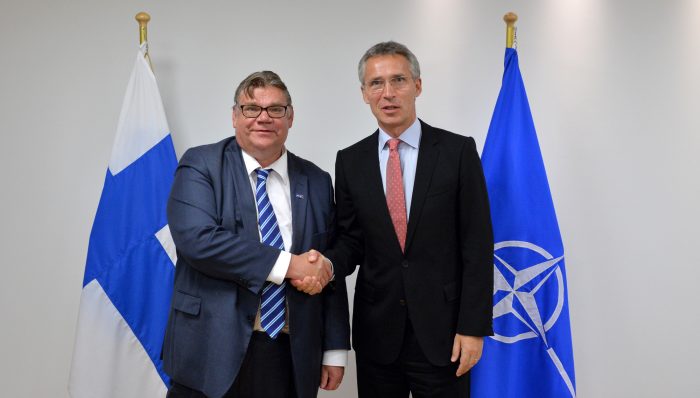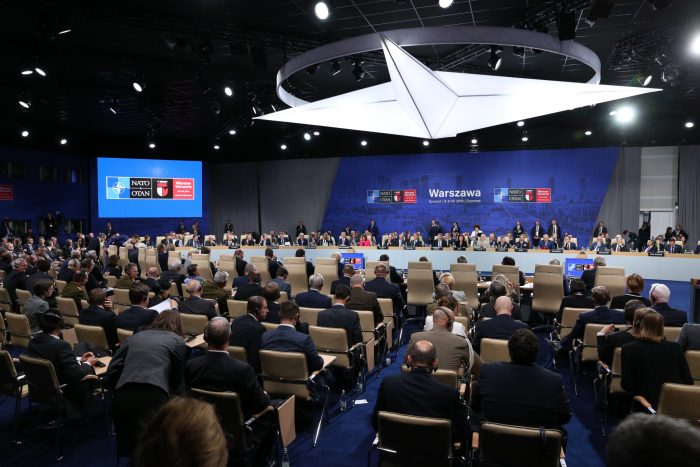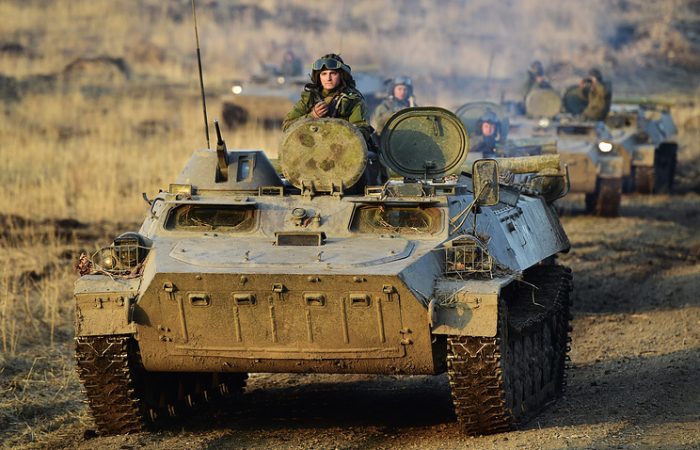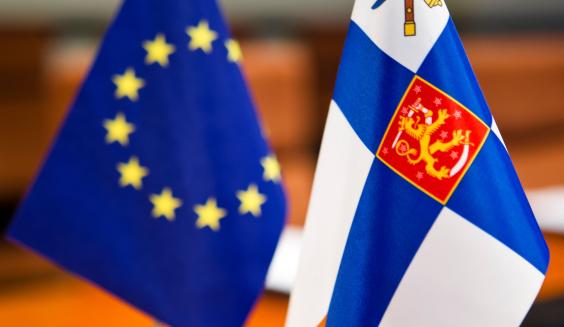By Iverson Ng

Finnish Minister of Foreign Affairs Timo Soini meets with NATO Secretary General Jens Stoltenberg in Sept, 2015.
Credit: NATO Newsroom
Finland is negotiating a bilateral defence agreement with the US this autumn. Jussi Niinisto, Finland’s Defence Minister, said in a telephone interview that the framework agreement between the US and Finland would cover areas including military training, information sharing, and research. Two months earlier, Sweden has signed a bilateral Statement of Intent with the US to increase cooperation between their defence ministries, armed forces, and defence agencies.
Stronger Finnish-US military tie is believed to be the outcome of the increasing Russian military presence in Crimea, the Ukrainian sovereign region which was annexed by Russian troops in March 2014 after the illegal referendum in the Crimean peninsula. Russia is planning to have a military exercise in Crimea next month in the midst of the Russian-Ukrainian conflict, in which two Russian servicemen were killed along the contact line between southern part of Ukraine and the Crimean peninsula in early August.

NATO summit in Warsaw, July 2016.
Credit: Ministry of Foreign Affairs of Poland
Nordic-NATO relations
In July, Finland and Sweden joined the NATO summit as non-NATO European countries in the Polish capital Warsaw. The summit adopted the Warsaw Declaration on Transatlantic Security, which reaffirmed the need for increasing NATO’s response military bases in Poland, Estonia, Lithuania, and Latvia. While the Nordic countries are strengthening their military cooperation with NATO, the public opinions are negative towards their possibilities of joining NATO as members. According to the polls from
For Finns, the fear of Russian invasion comes from Russian president Vladimir Putin’s threat to move their troops closer to the Finnish-Russian border if Finland joins NATO. But for Swedes, the nonalignment policy in Sweden and their belief in peace simply wouldn’t let any political party to agree on Swedish membership of NATO.

Russian troops holding military drill
Credit: Yuri Smityuk, Russian News Agency TASS
Security challenges amidst Russian expansionism
As a neighbouring country of Russia, Finland shares a 1,300 km border with the Russians, raising concerns about potential Russian expansionism. The tensions between Russia and the Northeast European countries have been increasing in recent years. The first incident came with an Estonian Intelligence officer who was abducted over the Estonian-Russian border in 2014, and he was later sentenced to be jailed in Russia for 15 years after a closed-doors hearing last year. In 2015, a US-based institute Center for European Policy Analysis published a report, claiming that about 33,000 Russian troops simulated a speedy seizure of northern Norway, Finland’s Åland islands, Sweden’s Gotland, and Denmark’s Bornholm.
Russian president Vladimir Putin vowed to “protect all overseas Russians” as he justified his military occupation in the Crimean peninsula two years ago, which raises concerns of the Nordic-Baltic countries. Among the Nordic-Baltic countries, there are 24% of ethnic Russians in Estonia, 27% in Latvia, 5% in Lithuania, and 60,000 of them in Finland, as Radio Free Europe and Finnish broadcasting company Yle reported. Even though the EU has extended economic sanctions on Russia, the conflicts between Ukrainian army and pro-Russian militants in Eastern Ukraine don’t seem to be deescalated, causing 71 casualties between June and July this year, according to a report from the UN Human Rights Office of the High Commissioner.

Credit: The Finnish Defence Forces
EU’s mutual defence treaty
The Article 42.7 of the Treaty of European Union also provides Finland and Sweden a mutual defence clause as they are both members of the EU. This article is similar to NATO’s Article 5, a collective defence treaty which means that an attack against one NATO member state is considered as an attack against all member states of NATO. Precisely, the European treaty states that “if a Member State is the victim of armed aggression on its territory, the other Member States shall have towards it an obligation of aid and assistance by all the means in their power, in accordance with article 51 of the United Nations charter”, meaning the treaty provides a direct country-to-country dialogue and support for mutual defence.
Currently, the Finnish Defence Forces participate in 60-70 military exercises and training events with the international community every year. As a member state of the EU, Finland prioritizes the EU’s Common Security and Defence Policy (CSDP) as the Finnish Defence Forces take part in European Defence Agency projects.
北歐國家面臨新一輪國家安全挑戰
芬蘭在秋季將會與美國就雙方國防協定進行討論。芬蘭國防部長Jussi Niinisto早前在電話訪問中表示美國與芬蘭的雙方協定將會包括軍事訓練、共享情報及資料搜集等。而瑞典則在二個月前與美國簽訂意向聲明,以提升雙方於國防部、武裝軍隊及國防機構方面合作。
俄羅斯於二零一四年三月透過非法公投來吞併烏克蘭部份國土克里米亞及後加強在當地駐軍的舉動令芬蘭與美國加深了彼此的軍事合作。俄烏兩國在八月因兩位俄羅斯軍人在烏克蘭南部與克里米亞邊境被殺而發生衝突,不過俄國仍然將會於下個月在克里米亞進行軍事演練。
北歐兩國與北約的最新關係
在七月,芬蘭與瑞典以非北大西洋公約成員國身份出席波蘭首都華沙的北約成員國理事會議。北約成員國在會後同意通過有關跨大西洋安全的華沙聲明。有關聲明確立了北約將會於波蘭、愛沙尼亞、拉脫維亞及立陶宛設置更多北約軍事基地。
縱使北歐國家如芬蘭和瑞典加強與北約合作,兩國亦未能得到民意支持而加入北約。根據芬蘭的民意調查,只有小於三分一人支持芬蘭加入北約,而瑞典的民調反映接近一半人反對瑞典加入北約。
芬蘭人不願意加入北約是基於對俄國入侵的恐懼,就如俄國總統普京早前威脅芬蘭,並聲稱如果芬蘭加入北約,俄軍將會移近俄國與芬蘭的邊疆。另一方面,瑞典人向來主張中立和相信和平共存,故此當地沒有政黨同意加入北約。
俄國擴張主義對北歐國家安全的挑戰
由於芬蘭國土與俄國邊境緊接,兩國更有長達一千三百公里的邊界,故此芬蘭亦擔心俄國有潛在的擴張意圖。近年來,俄國與北歐國家的關係變得逐漸緊張:一位愛沙尼亞情報人員於兩年前在愛沙尼亞與俄國的邊境給俄國人擄走,更於去年的俄國閉門審判中裁定罪成,並監禁十五年;而總部設於美國的歐洲政策分析中心在去年更發表報告,指出約三萬三千名俄軍於去年模擬快速奪取挪威北部、芬蘭的奧蘭島群(Åland islands)、瑞典的哥特蘭島(Gotland)及丹麥的博恩霍姆島(Bornholm)。
俄國總統普京曾經在兩年前以「保護所有海外的俄國人」為理由來入侵主權屬於烏克蘭的克里米亞半島,所以令與俄國接壤的芬蘭和屬於前蘇聯的波羅的海三國感到擔憂。據統計,愛沙尼亞有百分之二十四人口為俄裔、在拉脫維亞為百分之二十七、在立陶宛為百分之五,而在芬蘭更有六萬俄裔人。
雖然歐盟已經延長了對俄的經濟制裁,可是烏國軍方與親俄武裝部隊於烏國東部的武裝衝突仍未有緩和的跡象。據聯合國難民署最近的報告指出,烏國東部的武裝衝突在今年的六月至七月期間已經造成七十一人死傷。
歐盟的共同防衛條約
根據歐盟條約的四十二章七節,芬蘭與瑞典能以歐盟成員國為由而受到此共同防衛條約保護。此條約跟北約的第五章相似,因為北約的共同防衛條約說明「任何北約成員國受到攻擊即等同所有北約成員國受到攻擊」,而歐盟的條約則列明「如果任何歐盟成員國的國土受到侵襲,其他歐盟成員國有義務根據聯合國約章第五十一條來提供盡一切可能的支援」,意指此歐盟條約能為成員國間提供對話空間及共同防衛。
芬蘭國家軍隊於每年平均有六十至七十次與世界各國進行軍事演習及訓練,而芬蘭作為歐盟成員國亦有優先執行歐盟共同安全及防衛政策,其國防部隊亦有參與歐洲防衛機構的項目。

